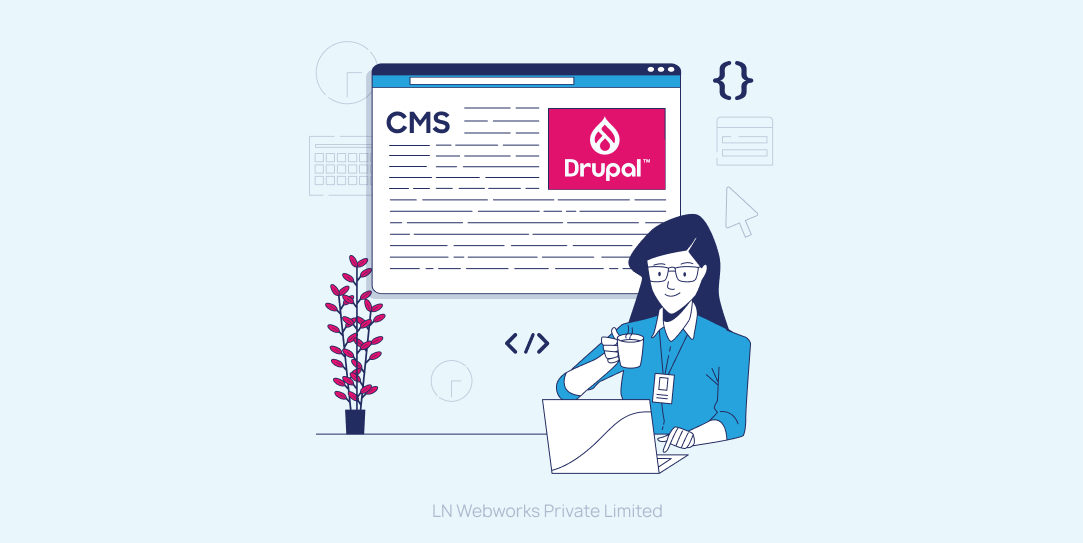Subscribe To Our NewsLetter
Share This Post:
Are You Wondering If Drupal Will Fit in With Your Business or Organization? Look No Further. This comprehensive Drupal guide has been composed by experienced Drupal experts to give a detailed introduction into this popular content management system. Due to Drupal's frequent iterations releases, this guide highlights key features essential for regular CMS users.
What Makes a Good CMS?
A good CMS serves as the cornerstone of your digital presence, so choosing one requires both technical and commercial considerations. Your CMS selection must address both current business challenges and opportunities while looking toward your long-term digital goals.
As you evaluate a content management system, it's important to keep in mind the following aspects when assessing it: functional requirements of the CMS; users' technical skill levels and delivery channels; costs involved and associated with content delivery channels. An ideal CMS will meet all these needs and more while serving as the backbone of your digital strategy.
An In-Depth Look at Essential Drupal features
At LN Webworks, we use Drupal as our CMS of choice for professional website and CMS implementations. In its 20+ year lifespan, Drupal has developed into a flexible yet robust system which powers sites such as WhiteHouse.gov and FedEx. Drupal offers numerous advantages for websites and online businesses alike, but these features stand out as being particularly significant.

Content Types
Professional Drupal implementation enables your website to support an extensive range of content types. By default, Drupal comes equipped with pre-built content types like pages, blogs and polls; custom modules allow for additional customization to create virtually any form of content needed on your site - for instance integrating an e-commerce module can add "products" category as well as multiple product classes/content types for retailers who offer different merchandise/services.
Social Platform Functions
Interestingly, Drupal was initially developed as a social networking platform. The core functionality includes user profiles, private messaging, blogs and discussion forums - providing businesses with an excellent foundation on which to build complex social systems and features such as client portal logins or other advanced dynamic interactions.
Blogs and Multi-User Blogs
Drupal stands out from other platforms with its blog feature that supports multiple bloggers, making it stand out from its competition. By assigning permissions appropriately, each blogger can have their own blog listed on blogrolls or sitemaps - this feature being made possible thanks to Drupal's robust permission system which enables web managers to create roles specifically for blog writers who grant them access only to their designated areas.
Custom URL Paths
Drupal's custom URL path feature is often overlooked but is an effective and valuable asset. Simply by installing a module, content managers can set specific paths for different types of posts to provide website visitors with clear URLs displaying titles and publication dates of articles they want them to see. Google and Yahoo both favor this method of site organization making this an invaluable feature for businesses seeking to enhance their online presence.
Flexible Theming Options
Drupal's theming options are highly adaptable and customizable, giving users the power to craft unique site layouts and formats. Unlike other content management systems, Drupal allows users to create "regions" for content placement allowing greater design possibilities allowing developers to craft complex, efficient websites without limitations on placement of content.
Drupal Taxonomy
Drupal's taxonomy feature enables users to easily organize their content with unlimited vocabularies and terms, organized hierarchically or by tag as users create posts using relevant keywords. Drupal allows for terms to be applied directly to posts as links so users and search engines can navigate easily to related content using these same keywords; additionally it permits the creation of limited vocabularies which provide greater control over how it's organized.
Final Words
Drupal is an adaptable content management system that offers businesses and organizations all of the features essential for website management. As part of your CMS selection process it is important to take note of Drupal's functional requirements, technical skill level requirements as well as its associated costs associated with content delivery channels - overall Drupal provides businesses and organizations with an effective CMS option which serves as the backbone of their digital strategy.
FAQ
Drupal is a highly configurable CMS offering extensive content types, customizable theming options, and powerful taxonomies. Additionally, its social platform functions make it ideal for creating complex social systems.
- Customizable Theming Options
- Extensive Range of Content Types Social Platform Functions for Networking
- Multi-User Blogs for Collaborative Content Creation.
- Custom URL paths for SEO optimization
Drupal is an extremely flexible content management system used for website construction across numerous industries and sectors - healthcare, media, entertainment and beyond. This CMS is well suited for large-scale sites with complex content needs like corporate intranets, government portals, educational institutions or community-driven social networks.
Yes, Drupal can integrate with many systems, including CRMs, e-commerce platforms, social media networks and third-party APIs - making it an adaptable and flexible choice for enterprise-level websites.
Drupal's Taxonomy feature facilitates categorization and organization of content on websites, making it easier for visitors to navigate and find what they need. Website managers can create and manage custom vocabularies and tags associating them with different types of content; providing an organized approach for managing website management. This feature enhances website management by offering systematic yet flexible methods of organizing and presenting information.
Share This Post:
Author Information

Deepak
Deepak has a close to decade of experience working as a brand and digital designer. His experiences with visual design, web design, print design, and animation have established him as a useful force wherever he is able to serve.
Let us help you to make an informed decision
Related Articles
April 12, 2023
Why Drupal CMS is Ideal for Your Business?
April 13, 2023
Pros and Cons of Choosing Drupal for Your Large eCommerce Website
April 13, 2023



